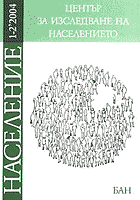Идейните корени на наталистичната и либералната политика в областта на семейството
The Grounds of the Natalist and Liberal Politics towards the Family
Author(s): Marta SougarevaSubject(s): Social Sciences
Published by: Институт за изследване на населението и човека - Българска академия на науките
Summary/Abstract: The article is devoted to the ideological assumptions and ideas underlying contemporary population and family policies in European countries. Two main ideologies are in the focus: Malthusianism and Marxism, which motivate two types of policies put into practice in various countries after the Second would war, namely the liberal and the pro-natalist ones. As far as Bulgaria belongs to the countries which have had pro-natalist policy in this period (while at the same time Marxism was dominant ideology), the accent of the article is on alternatives views, which are less known. A brief overview of two groups of population theories in presented: the demographic transition theory, and micro-economic theories of demographic behavior, centered around the so-called “economic theories of fertility”. The aim is to reveal the genesis and the evolution of natalistic views, which were dominant in all countries in the past. In the modern society of low fertility the discourse around the question what policy should the state implement regarding fertility, is integrated into a general ideological discourse, in which demographic problems obviously occupy an important place.
Journal: Население
- Issue Year: 2004
- Issue No: 1-2
- Page Range: 67-84
- Page Count: 17
- Language: Bulgarian
- Content File-PDF

